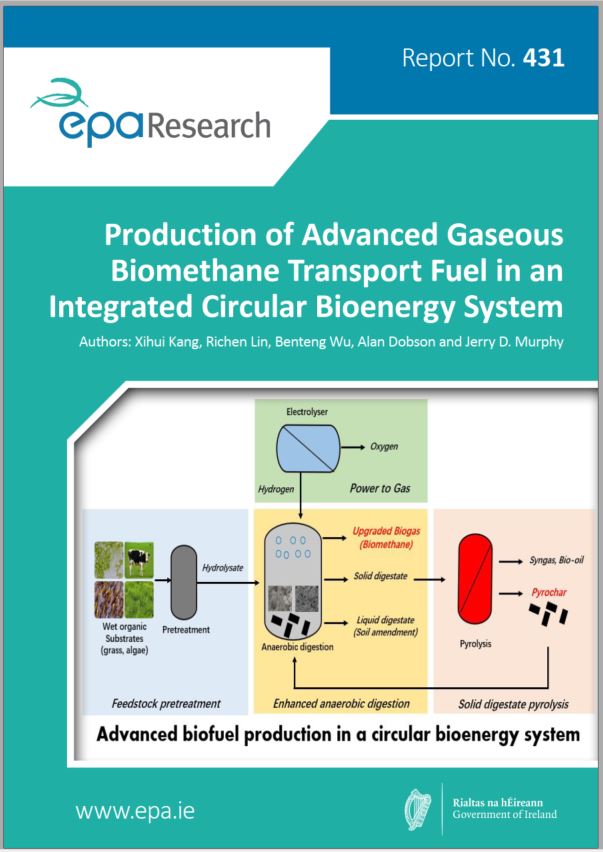Research 431: Production of Advanced Gaseous Biomethane Transport Fuel in an Integrated Circular Bioenergy System
Authors: Xihui Kang, Richen Lin, Benteng Wu, Alan Dobson and Jerry D. Murphy
Summary: Transport is by far the largest source of energy-related CO2 emissions in Ireland. This highlights the need for a rapid transition from a linear fossil fuel-based economy to a bio-based economy that treats waste as a commodity, reduces GHG emissions, sequesters carbon and produces biofuels, biofertilisers, and bioproducts. The aim of the Advanced Gaseous Biomethane project was to develop an integrated system that produces biomethane using biomass to fuel the transport sector cleanly and support Ireland in achieving key emissions targets.

Identifying Pressures
Ireland’s Climate Action Plan 2021 (CAP21) aims to reduce greenhouse gas (GHG) emissions by 51% by 2030 and to achieve net-zero emissions by 2050. As part of this plan, the emissions reduction goal for transport is 42–50% by 2030. Transport is by far the largest source of energy-related CO2 emissions in Ireland, accounting for over 40% of such emissions in 2019; this sector is the least decarbonised in Ireland. A newly launched EPA report suggests that the overall GHG emissions reduction in Ireland would be only 28% (against a target of 51%) by 2030, even if all measures from CAP21 were implemented. This highlights the need for a rapid transition from a linear fossil fuel-based economy to a bio-based economy that treats waste as a commodity, reduces GHG emissions, sequesters carbon and produces biofuels, biofertilisers and bioproducts. The aim of the AGB project was to develop an integrated system that produces biomethane using biomass (such as grass, silage or food waste) to fuel the transport sector cleanly and support Ireland in achieving key emissions targets.
Informing Policy
To meet Ireland’s CAP21 emissions targets, we propose:
- A circular bioeconomy: this would involve developing a bioenergy and carbon capture and use (BECCU) system.
- Renewable energy and transport: using animal manure, grass silage and renewable hydrogen from renewable electricity in Ireland, the proposed system may produce as much as 1 billion m3 of renewable biomethane by 2035, reducing emissions by 2.6 Mt CO2-eq per year when replacing diesel consumption in transport. This equates to over 25% of the transport-related CO2 emissions in 2020.
- Sustainable agriculture: the modelled system offers a reduced carbon footprint of farming and a more sustainable agriculture system, with improved soil quality and increased crop yields.
Developing Solutions
The AGB project proposes a cascading circular system in which anaerobic digestion is the key platform technology enabling biomethane production. With the integration of biomass pyrolysis, the system can deliver advanced biofuels for the transport sector or produce high-value biochemicals, biofertilisers and biochar while also treating a variety of organic wastes. Given recent technological advancements such as increased efficiency in biochar production and the expected reduction in the cost of the hydrogen needed to run this biomass conversion system, the system has become an increasingly viable option for biomethane production. Such circular systems are widely recognised as having the potential to provide promising economic and environmentally sound solutions to achieving the ambitious targets set in CAP21.
https://www.epa.ie/media/epa-2020/research/research-publications/Report-cover-image-431.jpg